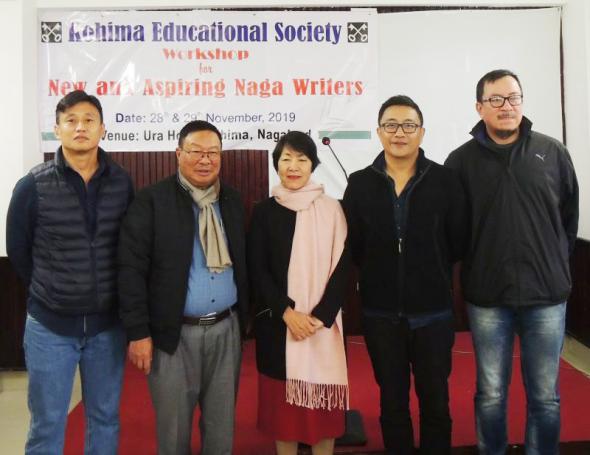Part of the work we support, and which is arranged by our sister organisation in Kohima is the new venture of writers' workshops. The workshops, the first of which were held in November 2019, are aimed at both new and aspiring writers in Nagaland. Video coverage here shows our colleagues speaking at the event.

From Left: Dr Aküm Longchari, Dr P Ngully, Easterine Kire, Kethoser Kevichüsa and Pradip Phanjoubam at the workshop for new and aspiring writers organised by the Kohima Educational Society at Hotel Ura on November 29. (Morung Photo)
Morung Express News
Kohima | November 29
“Writing is a brutal art and you have to be prepared for the solitude that will ensue when the writing begins,” advised writer Easterine Kire at the second day of the workshop for new and aspiring writers organised by the Kohima Educational Society (KES) at Hotel Ura.
Speaking on ‘Techniques of fiction writing: My experience,’ Kire expressed that writing is brutal because 'we are giving away a part of us and in the age of social media'. With almost half the population accessing social media, Kire viewed there is a high chance that one's work will be a subject of ridicule. Kire also advised young writers not to rush their best work out in social mediums as it is easy for their ideas to get stolen.
Putting forward valuable tips for the young writers, Kire instructed them to hold on to the first draft of their works before publishing. "It is prudent to leave some space between the paragraphs so that you leave room for more entries when you return with new ideas,” said Kire. In the process of editing, Kire stated that the difference between a mediocre and a great book is editing. “Trust your editors. What an editor can bring to your book is really amazing and we have a lot of editing that needs to be done with books from Nagaland,” said Kire.
As a writer, Kire recommended the three rules she follows: 'Be humble, be teachable and be noble'. For the noted Naga Writer, being humble is so important and is interconnected with being teachable because it is only through one's humility that enables new learning.
“Self-centredness is a barrier for one to be teachable and we should break free from the thought that everything revolves around us,” added Kire, who is also winner of the first Gordon Graham Prize for Naga Literature (Fiction).
‘We need to take ownership of the process and become co-creators of our history, our culture, of our future. That's where writing becomes powerful,’ remarked Longchari.
Where you are is the center of the world. In the process of de-colonising stories, also comes the question of power. When identities are imposed and defined, the question of power becomes very far away. "Understanding of power is very important in de-colonising methodologies. We need to reflect on whether the stories we write sustains the status quo or empower the grassroots," stated Longchari advising the writers on the need to engage with power structures, where it's presence are felt even within the church, social organizations etc in present day Naga society. “When our writing does not strip away the core of power, power structures remains and status quo repeats itself,” noted Longchari. The essence of engagement in self-reflection on writings, together as a collective and also as individuals was also stressed, where Longchari expressed the hope of Nagas becoming the co-creators of their own history.
Kethoser Kevichüsa, winner of the first Gordon Graham Prize for Naga Literature (Non-fiction), presented a discourse on ‘Life skills and tools for required for a fulfilling life’ while Pradip Phanjoubam, editor of Imphal Free Press spoke on 'Literature/books and their potential in North East India.’
Dr P Ngully, Chairman KES spoke on 'Mental health and writing'.